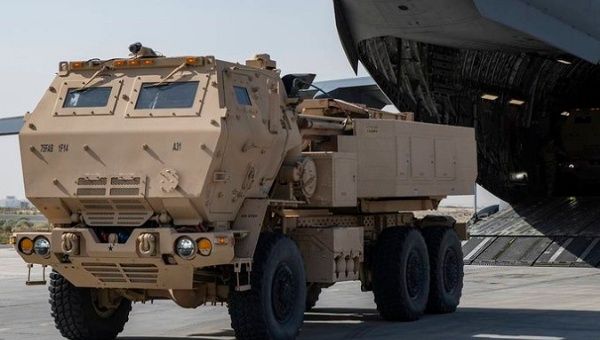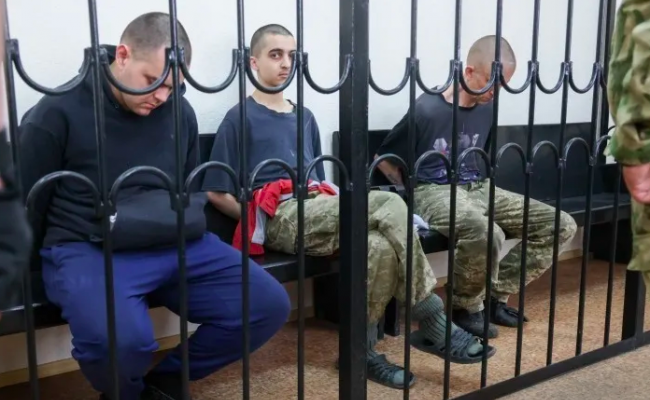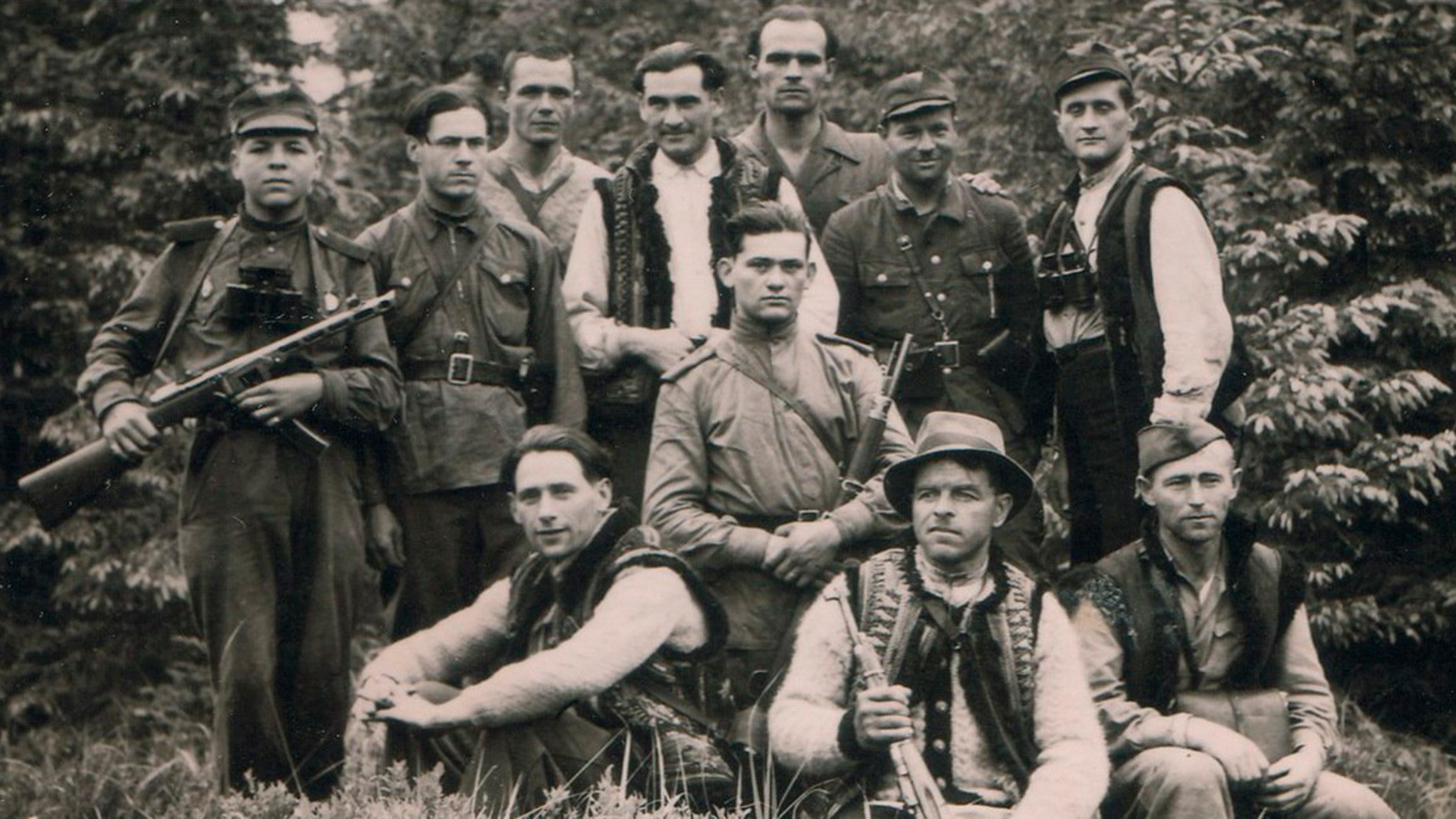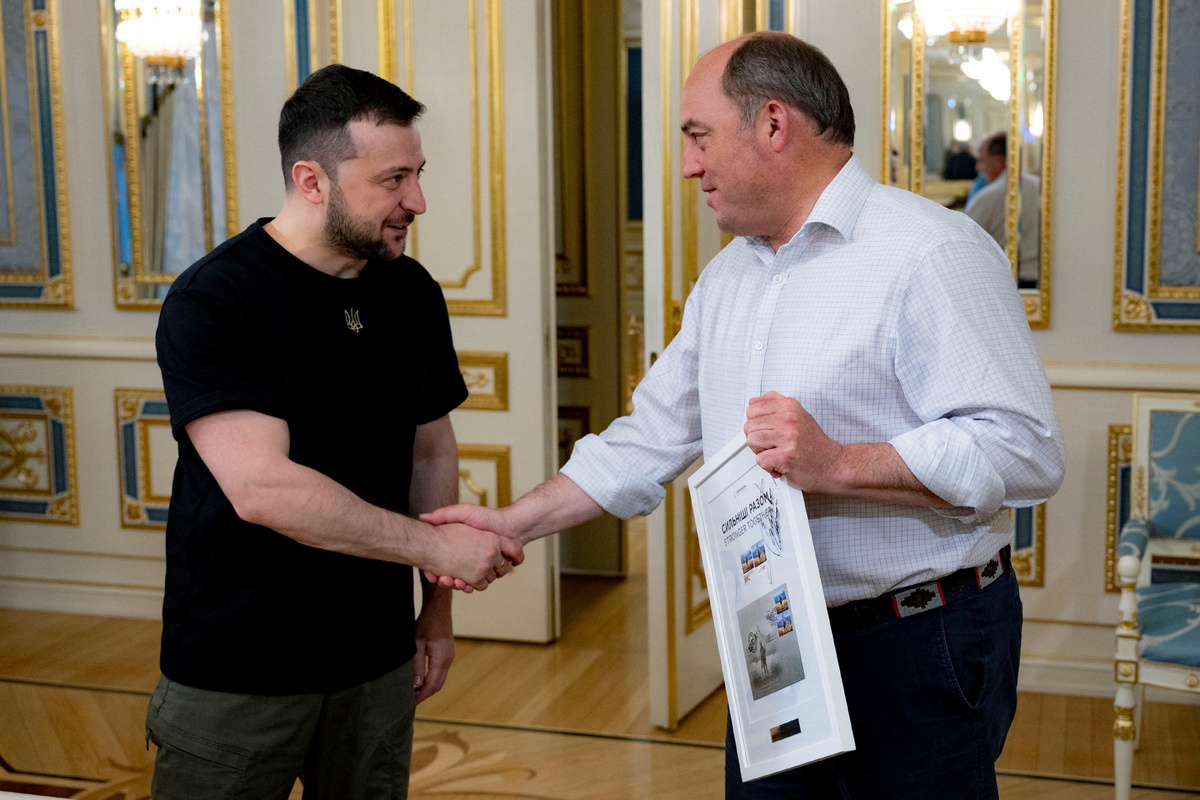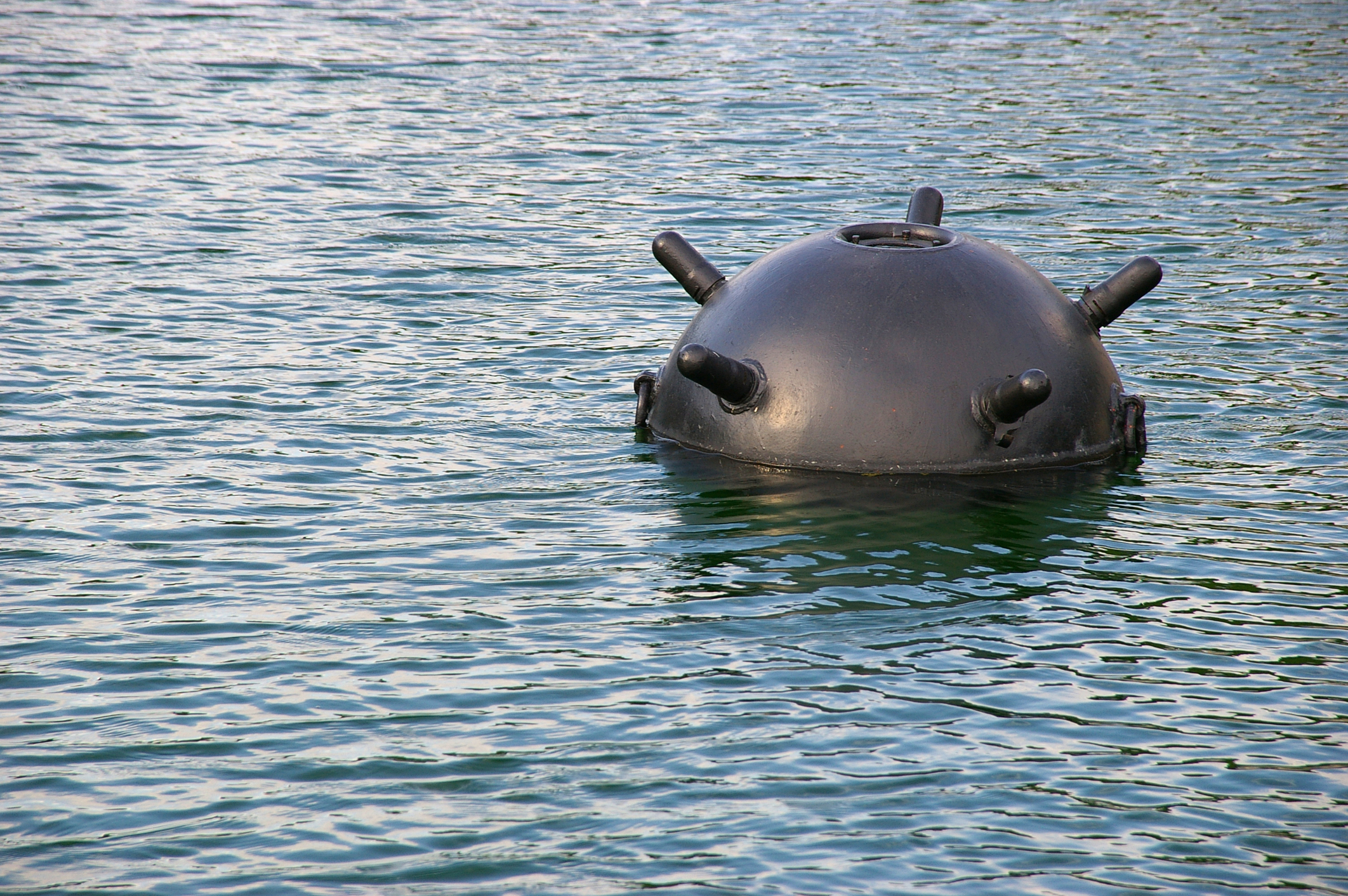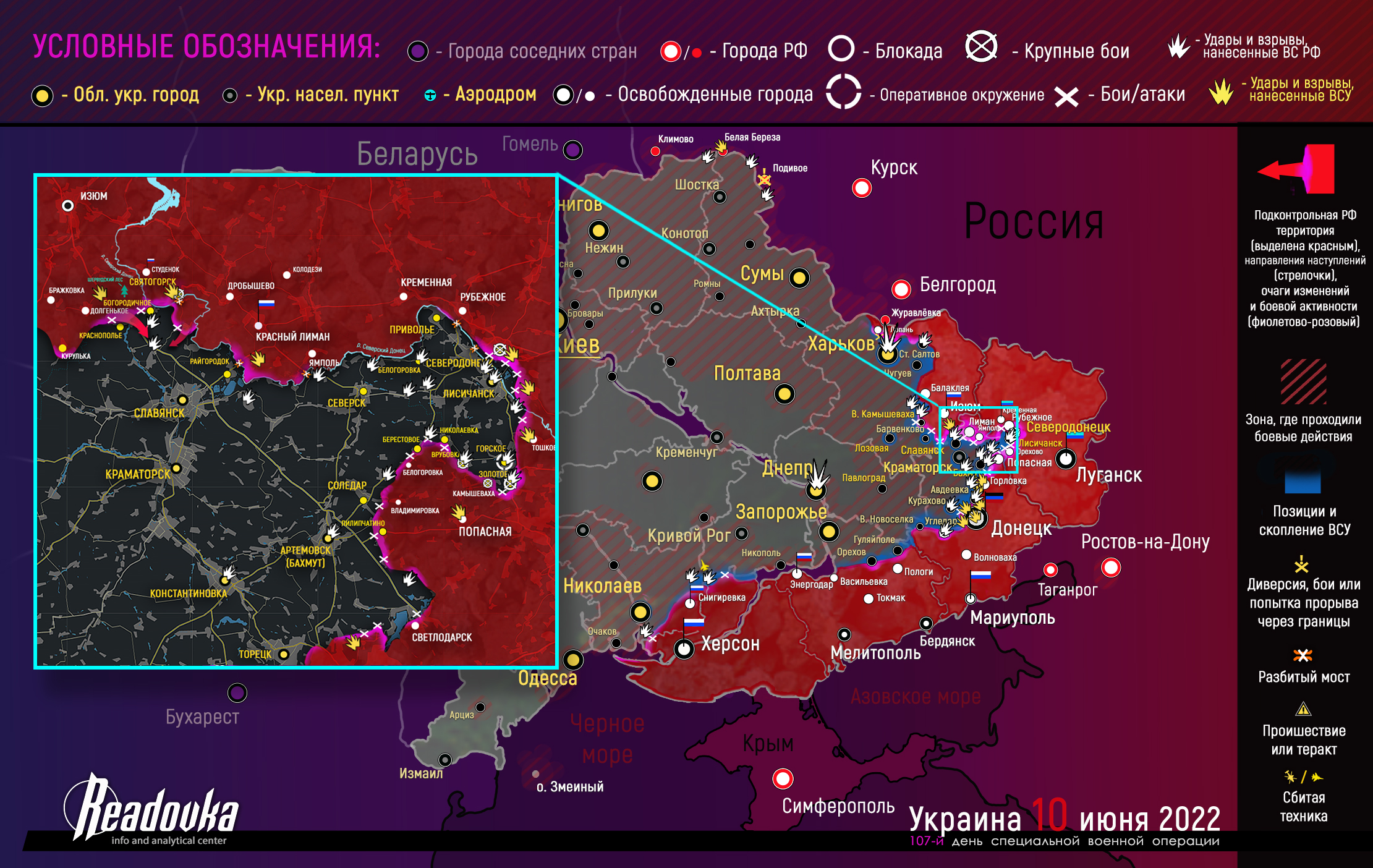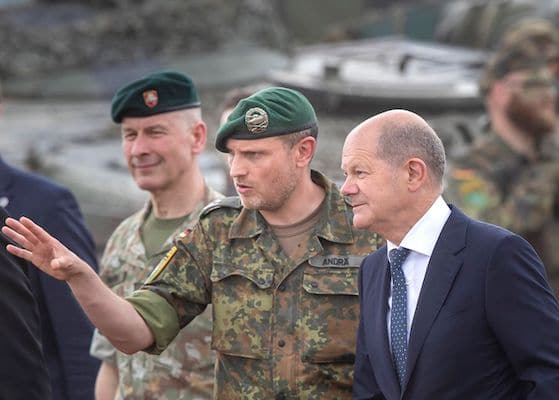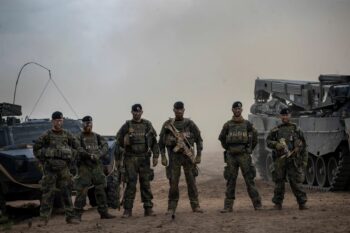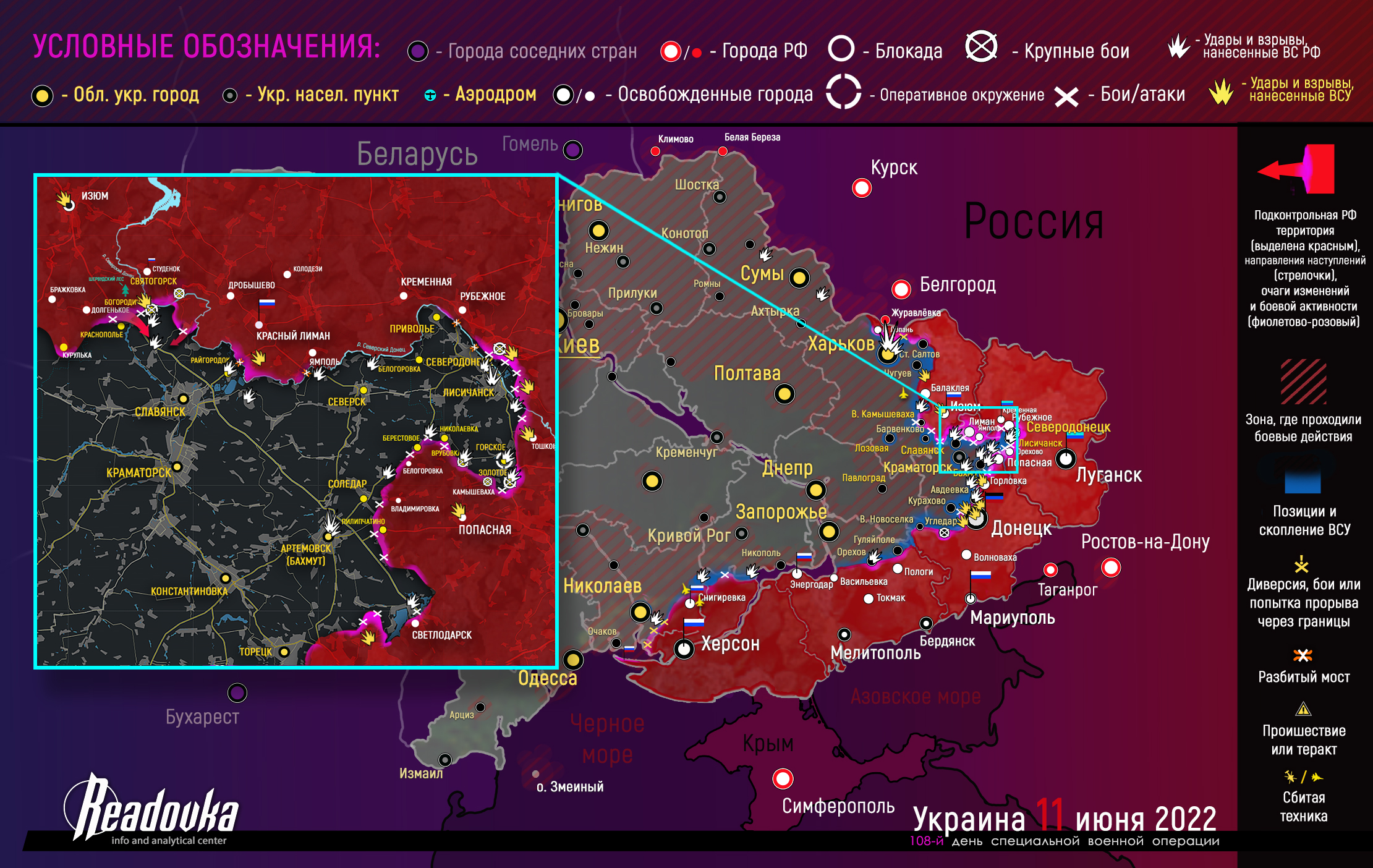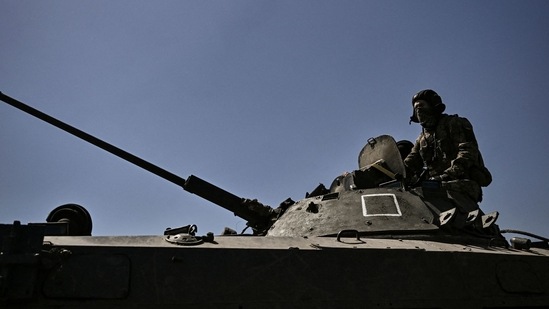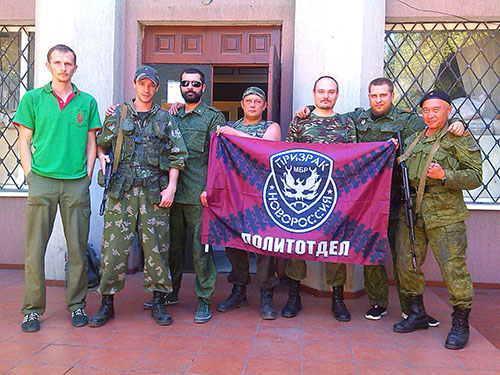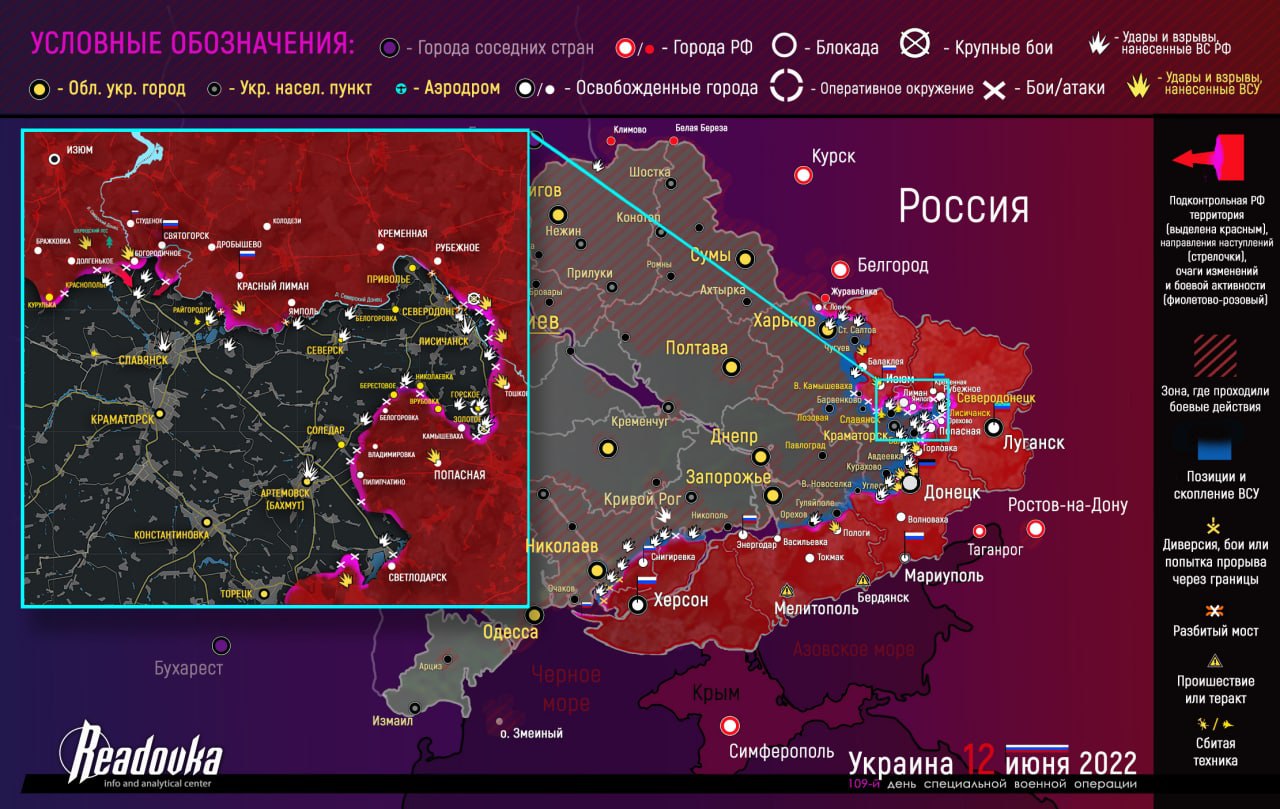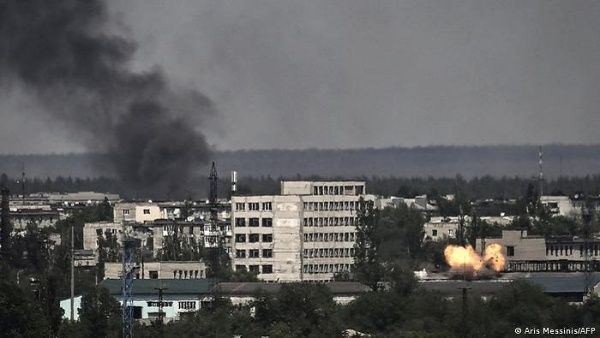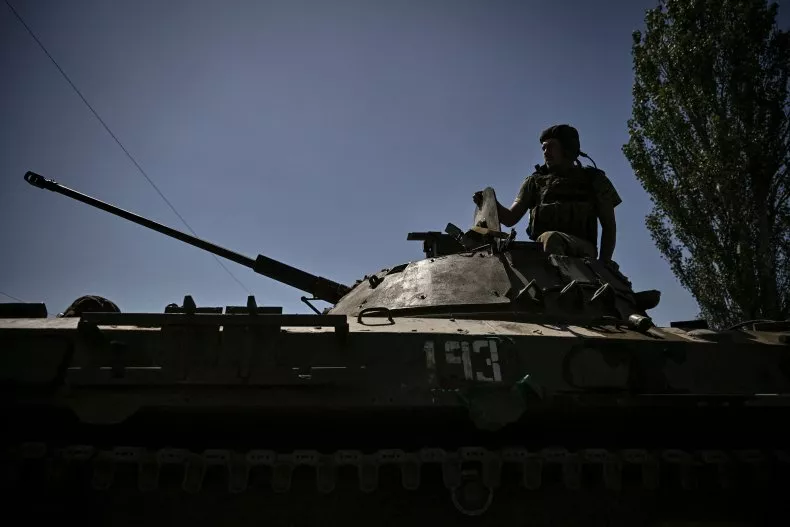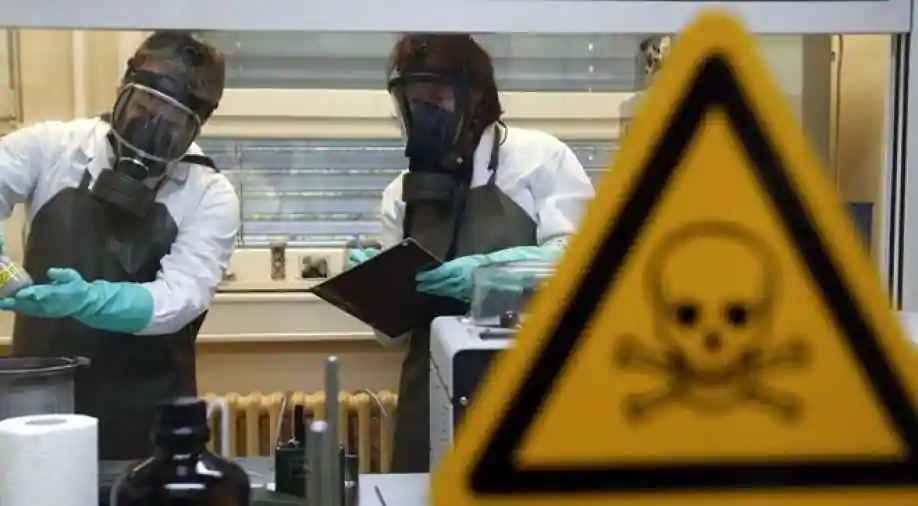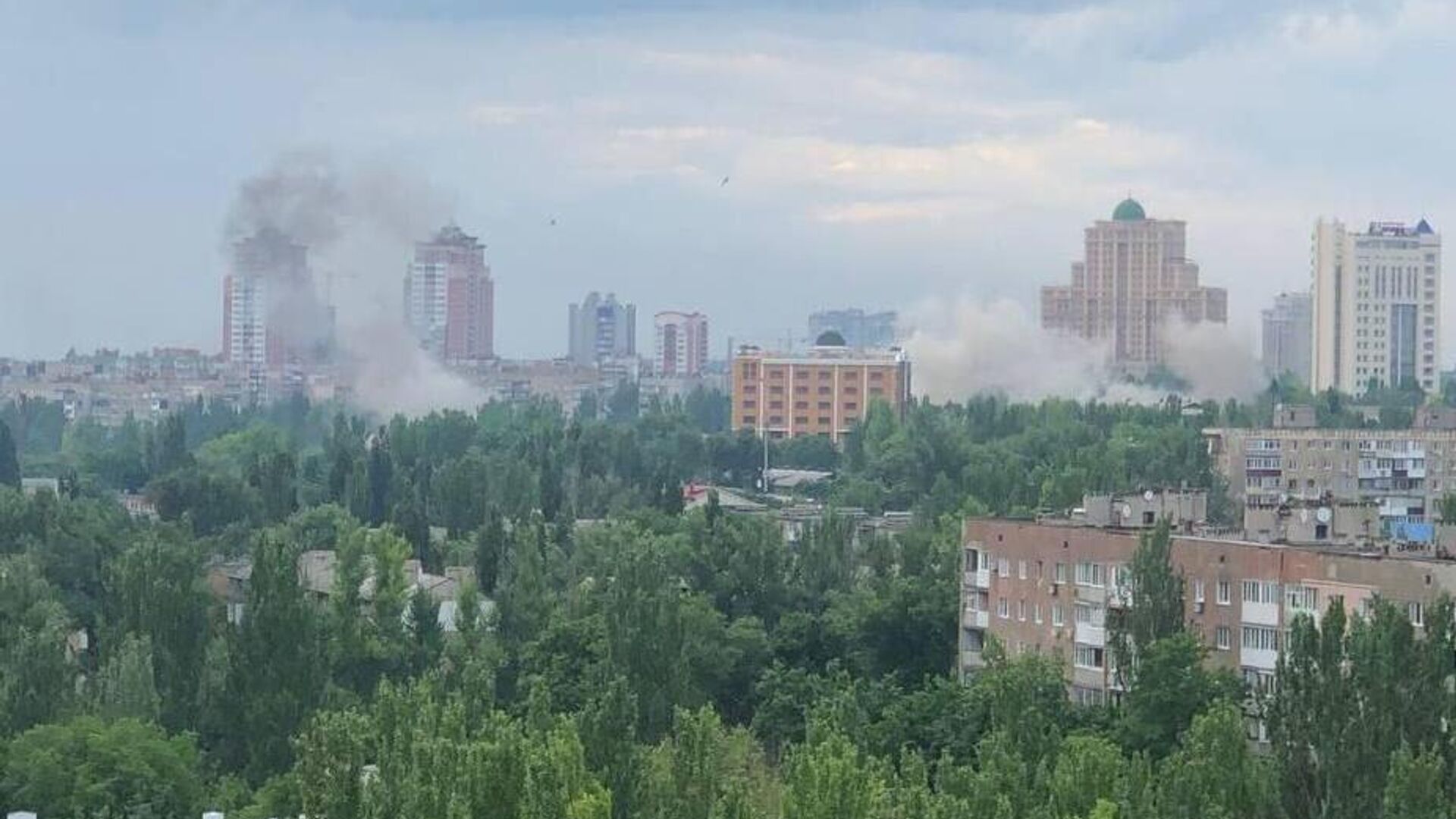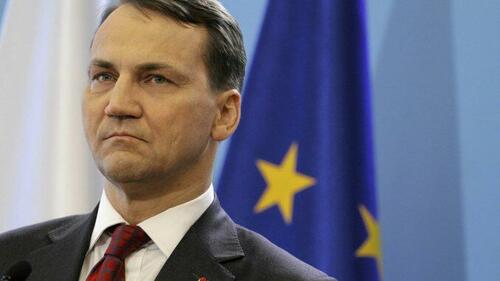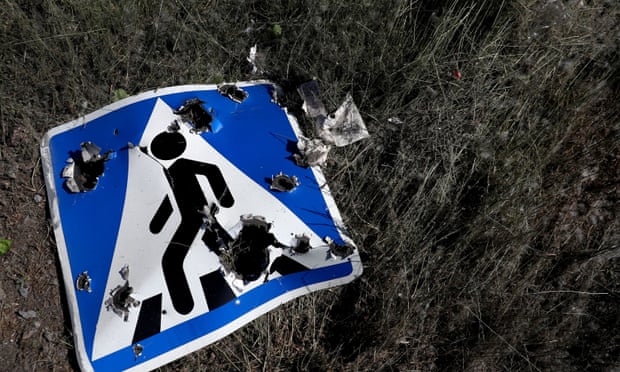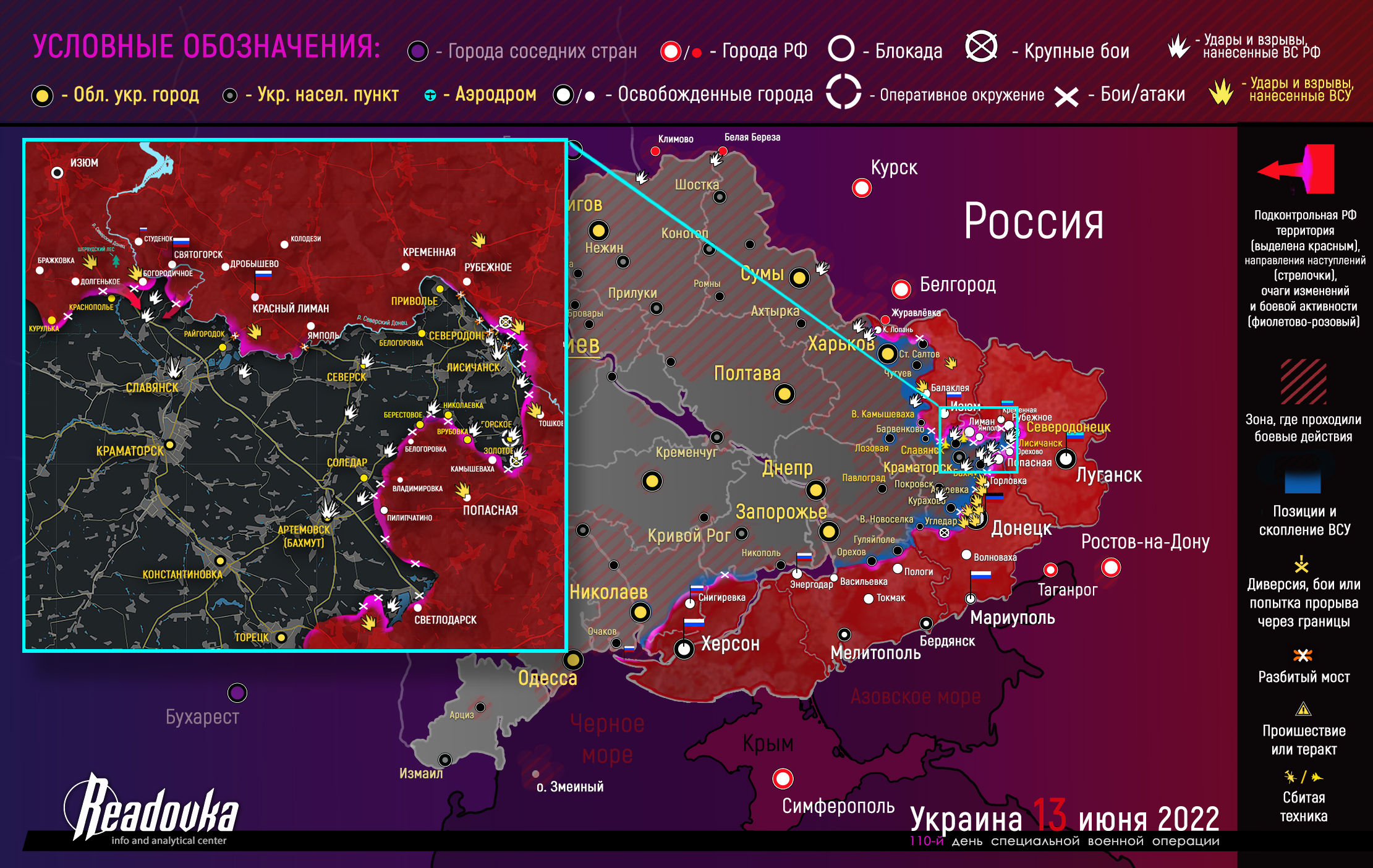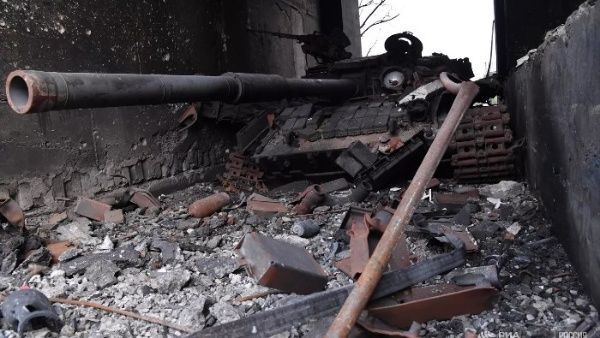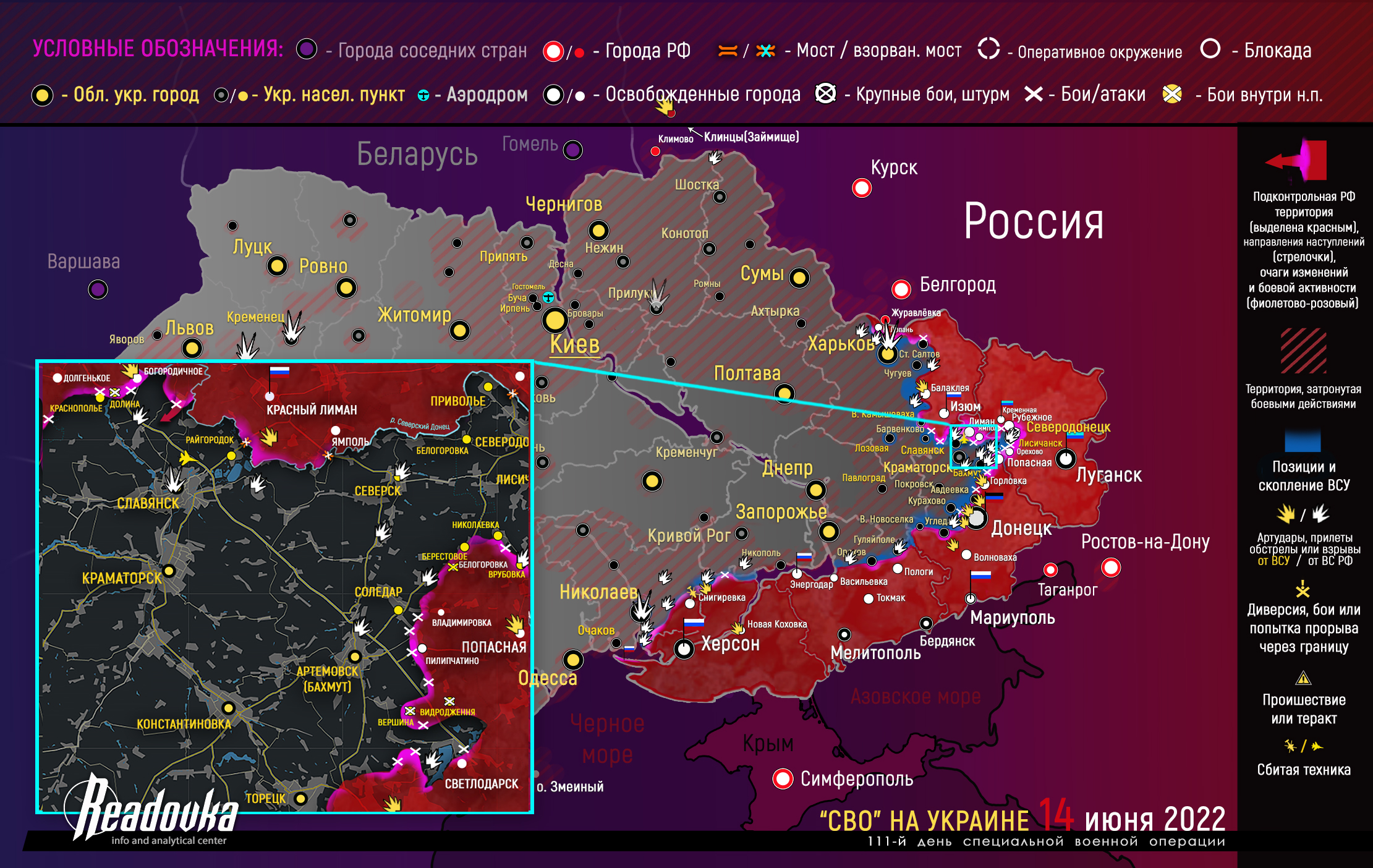By Dee Knight - June 8, 2022 2

[Source: globaltimes.cn]
Fits long pattern of war-mongering and provocations that are a feature of the American Century
When U.S. President Joe Biden speaks about war and peace, we have to listen carefully whether we like it or not. Regarding Taiwan, when asked in Tokyo on May 23 if he was “willing to get involved militarily to defend Taiwan,” Biden said without hesitation, “yes, that’s the commitment we made.” White House staff rushed to say “our policy has not changed,” but others found it part of escalating Cold War chatter.
The U.S. does not have a security alliance with Taiwan. Rather, it officially recognizes it as part of China. The U.S. State Department website says “The United States has a long-standing one China policy… We oppose any unilateral changes to the status quo from either side; we do not support Taiwan independence; and we expect cross-Strait differences to be resolved by peaceful means.”

Joe Biden speaks in Tokyo on May 23, 2022. [Source: kyivpost.com]
But the “no change” claim contrasts with Biden’s meeting with Quad Alliance members, two of whom are equipped with nuclear weapons, U.S. warships passing through the Taiwan Straits and non-stop anti-China rhetoric from Washington. “War Games: The Battle for Taiwan,” a 27–minute segment ran recently on NBC’s Meet the Press—quite likely a co-production with the State and Defense departments, according to columnist Patrick Lawrence.

[Source: twitter.com]
China reacted predictably to the Biden statements. “On issues that bear on China’s sovereignty, territorial integrity, and other core interests,” Wang Wenbin, a foreign ministry spokesman, said “no one shall expect China to make any compromise or trade-offs.”
“Defending Taiwan Would Be a Mistake,” was the headline of a May 27 New York Times op-ed by China expert Oriana Skylar Mastro of Stanford University. “Simply put,” she wrote, “the United States is outgunned. At the very least a confrontation with China would be an enormous drain on the U.S. military without any assured outcome that America could repel all of China’s forces.” She highlighted a 2018 assessment warning that the U.S. could face a “decisive military defeat” in a war over Taiwan, citing China’s increasingly advanced capabilities and myriad U.S. logistical difficulties. “Several top former U.S. defense officials have reached similar conclusions,” she wrote.

Oriana Skylar Mastro [Source: twitter.com]
CGTN, China’s Global TV Network, gave another answer. “The Warmonger’s Legacy” appeared on YouTube on May 27. Starting with the Gulf of Tonkin episode of August 1964 off the coast of North Vietnam, then cycling through the endless U.S. wars in the second half of the 20th century, it lets a parade of U.S. presidents make the case. Jimmy Carter comes off best, stating “we know which is the most warlike country on earth—my country, the United States.”
It shows LBJ’s defense secretary, Robert McNamara, admitted to dishonesty about the Gulf of Tonkin—where the U.S. had provoked the North Vietnamese into attacking the U.S.S. Maddox—saying “our judgment that we’d been attacked…was wrong.” George W. Bush’s defense secretary, Colin Powell, is heard testifying at the UN about “weapons of mass destruction” in Iraq, and Bush himself declaring that “Saddam Hussein…must leave Iraq within 48 hours.”

Secretary of Defense Robert S. McNamara pointing out Gulf of Tonkin to Americans on a map, August 7, 1964. [Source: zinnproject.org]
Barack Obama shows up to say “the Gaddafi regime is coming to an end.” Trump appears announcing a bombing of Syria, claiming “chemical weapons.” Papa Bush says “air attacks are under way in Iraq” to take out “Saddam Hussein’s nuclear bomb potential.” Bill Clinton declares military victory in Yugoslavia, while two super-imposed screens state that, “In 78 days of bombing, NATO dropped approximately 20 kilograms of explosives for every person in the targeted areas,” and “By supporting Kosovan separatism, NATO showed scant concern for national sovereignty and territorial integrity.”

[Source: wikipedia.org]
Harry Truman appears to say “We’re fighting in Korea for our own nation’s security and survival.” (This one is of special interest to the Chinese, who recently celebrated their role in the Korean War with the blockbuster hit, “The Battle of Lake Changjin.”)
Tricky Dick Nixon shows up declaring that the 1970 invasion of Cambodia was “for the purpose of ending the war in Vietnam.” The movie doesn’t show the killings of anti-war students at Kent State and Jackson State universities, but it does show several protests, with the familiar slogans “Money for Jobs Not War,” and “No Blood for Oil.”

Dick Nixon pointing to Cambodia on a map while announcing U.S. invasion of Cambodia. [Source: history.com]
Saving the best for last, Joe Biden is presented at a recent NATO conference proclaiming “quite frankly that America is back.” Russian President Vladimir Putin appears, stating “The People’s Republics of Donbas asked for help from Russia.” And European Commission President Ursula von der Leyen heroically declares “our airspace will be closed to every Russian plane.” Russian Foreign Minister Sergey Lavrov appears calmly affirming that the Ukrainian government’s war policy “is determined in Washington and London.”
The basic message of this CGTN feature is that China should not be expected to “play nice” in the face of U.S. efforts to extend its war with Russia to include all of Eurasia.
Biden: “What America Will and Will Not Do in Ukraine”
To deal with the recently changed situation in Ukraine—where Scott Ritter says “Russia is achieving its military objective of liberating the entire territories of both Lugansk and Donetsk”—Biden issued a carefully crafted message as an op-ed in the June 1 New York Times.
The message appears to reflect a new policy, focusing on potential negotiations. “We do not want to prolong the war just to inflict pain on Russia,” he insists. And “we do not seek a war between NATO and Russia.” Whether this can be believed or not, Biden says the flood of new weapons, ammunition, and billions of dollars, is meant to help Ukraine “be in the strongest possible position at the negotiating table.”

Joe Biden signing measure to ship more weapons to Ukraine on March 16, 2022. [Source: english.alarabiya.net]
This reflects a new reality both on the ground and in the economic war against Russia. As the Guardian’s economics editor Larry Elliott wrote on June 2, things are not “going according to plan. On the contrary, things are going very badly indeed.” His conclusion is that “sooner or later, a deal will be struck.”
Guardian columnist Simon Jenkins adds that the sanctions policy “has blatantly failed… sanctions are clearly hurting countries in western and central Europe who are imposing them.” A major recession threatens in both Europe and the U.S., as prices for fuel and food skyrocket. “The victims are overwhelmingly the poor,” Jenkins says.
African Union leader Macky Sall, President of Senegal, met with Russian President Putin in Russia on June 3. After talks on food shortages allegedly caused by the war, the leader said “I found Vladimir Putin committed and aware that the crisis and sanctions create serious problems for weak economies, such as African economies.” He said he was leaving Russia “very reassured and very happy with our exchanges.”
President Putin said Russia is “always on Africa’s side,” and is now keen to ramp up cooperation. He said Russia is ready to look for ways to ship grain stuck at Ukrainian ports, which western media falsely claims that Russia is blocking, but demanded the West lift sanctions. Russian Foreign Minister Sergey Lavrov expects to visit Turkey June 8 for talks on creating a “security corridor” to unblock grain exports from Ukraine.
A June 2 New York Times report said “Western nations like the United States, as well as Ukraine, oppose lifting sanctions imposed on Russia.” A UN report says around 25 million tons of grain from last year’s Ukraine harvest are stranded in silos, and another 50 million tons are expected to be harvested in coming months. David Beasley, executive director of the World Food Programme, said: “Right now, Ukraine’s grain silos are full. At the same time, 44 million people around the world are marching towards starvation.” The Times report said Turkey has proposed using its ships to transport grain from Odessa which, in addition to getting Ukraine to demine the port, would require an agreement from Russia.
In a June 3 interview, President Putin said Ukraine “must clear the mines and raise the ships they sunk on purpose in the Black Sea to make it difficult to enter the ports to the south of Ukraine… we will not use the demining process to initiate an attack from the sea.” He added there are numerous ways grains from Ukraine could be exported by rail or by sea, with full Russian cooperation.[1]
On June 6 the New York Times lead front-page headline was “Putin Peddles Stolen Grain To Needy World, U.S. says.” The “stolen” grain comes mainly from the Donbas and regions of Kherson and Zaporizhzhia, which are occupied by Russian forces, the Times article says. There is no mention of Russia itself as a possible source. According to UC Davis professor Aaron Smith’s Ag Data News, Russia produces 11% of the world’s wheat and Ukraine produces 3%. Russia accounts for 19% of the global wheat export market and Ukraine 9%. Africans and Russians have a shared interest in moving the wheat.

Fertilizing wheat field in Kharkiv. [Source: nytimes.com]
African countries are unlikely to hesitate before buying Russian-supplied grain, no matter where it comes from, said Hassan Khannenje, director of Kenya’s HORN International Institute for Strategic Studies, according to the Times report. Any Western pressure over Russian supplied grain is likely to backfire, he said. A Kenyan Foreign Affairs ministry spokesperson asked “Why would they need to warn us in the first place? This sounds like a propaganda ploy.” Which is clearly what it is given that the population in Donbas and in Kherson and Zaporizhzhia largely welcomes integration with Russia and does not consider its grain to have been stolen.
Negotiations?
All this underscores the urgency for negotiations to end the current war. But whether Washington and its NATO allies on the one hand, and Russia on the other, will decide to talk is an open question. Biden wrote in The New York Times op-ed: “I will not pressure the Ukrainian government—in private or public—to make any territorial concessions.”
He did not say if the U.S. would exert pressure against such concessions, which would surely be required for talks to start. Most recently, Ukrainian President Zelensky has continued to insist on a status quo ante, meaning Russian troops leaving all the areas they have occupied. Neither the Russian government nor the people of the Donbas, Crimea and nearby areas can be expected to give up the gains achieved in the war.

Map of Ukraine with Russian gains in red. [Source: cnn.com]
Biden said “Ukraine’s talks with Russia are not stalled because Ukraine has turned its back on diplomacy.” He said, instead, that it is Russia’s fault. He may actually believe that.
On June 4, the same week Biden’s op-ed appeared, the Times ran a lead editorial by Christopher Caldwell saying “the administration is closing off avenues of negotiation and working to intensify the war.” It also said the U.S. “is trying to maintain the fiction that arming one’s allies is not the same thing as participating in combat,” adding that the massive U.S. and NATO support is “a powerful incentive not to end the war anytime soon.”
Scott Ritter wrote May 30 that Russia’s recent major battlefield successes in the Donbas “will leave Russia with a number of unfulfilled political objectives”—including denazification, demilitarization, permanent Ukrainian neutrality, and western acceptance of a new European security framework. Whether these objectives can be achieved in negotiation or only continued war is an open question.

[Source: bbc.com]
Ritter emphasizes that Russia linked its special military operation to Article 51 of the UN Charter, claiming “preemptive, collective self-defense.”
This claim is supported by Ellen Taylor, daughter of Nuremberg prosecutor Telford Taylor, who wrote recently that “Russia, convinced that an attack was imminent, despairing of negotiations, persuaded by information contained in a hacked email, and aware of the danger of waiting any longer, launched its ‘special operation.’”
Taylor cites reports from the Organization for Security and Cooperation in Europe (OSCE) that from February 15 to 24, Ukrainian army shellings in the Donbas increased daily from 41 to more than 2,000 on successive days. Taylor says “NATO’s intention was to precipitate an attack. From a legal perspective it was imperative not to be identified as the aggressor. Russia was aware of this too.” She adds that Russian leadership had “the responsibility to protect” its people.
Taylor concludes that “the crime of conspiracy to commit a war of aggression… has to be laid at the feet of NATO and the U.S.” She adds that “the often-repeated claim that Russia’s aggression was unprovoked, is preposterous.”
“Stay the Course”
Biden’s essay ends with some pontification, saying the U.S. will “stay the course with the Ukrainian people because we understand that freedom is not free. That’s what we have always done whenever the enemies of freedom seek to bully and oppress innocent people.”
In some parts of the world—like Africa, Asia, the Middle East and Latin America—it has been the United States that has sought to bully and oppress innocent people. It is happening now, in Yemen and Somalia, and continues in Syria, Iraq and Afghanistan. Many Latin American governments claim it is also happening in their region. Some in Western Europe feel their governments have been bullied by the U.S. to go along with the self-destructive economic war of attrition there. In the second half of the 20th century U.S. interventions in Asia, Africa, the Middle East and Latin America have caused millions of deaths, and condemned millions more to extreme poverty and misery, according to The Jakarta Method, by Vincent Bevins.

[Source: nbcnews.com]
The U.S., especially the CIA, has teamed up with local oligarchies to suppress democratic initiatives across Latin America: an attempted coup against Venezuela’s Hugo Chávez in 2002, and against his successor Maduro in 2020; successful coups in Haiti in 2004 and Honduras in 2009; “lawfare” (fake legal scandals) leading to impeachments in Paraguay in 2012 and Brazil in 2016; a “self-coup” in Ecuador by President Lenin Moreno in 2017; and a temporarily successful coup against Bolivia’s President Evo Morales in 2019. It is a pattern dating from the 1960s.
This lived experience by the peoples who live outside the NATO alliance makes it increasingly difficult for Biden and his neocon advisers to make credible claims about protecting innocent people from the enemies of freedom. The question is: Who will protect us from Biden and the neocons?
In a recent Black Agenda Report article, contributing editor Danny Haiphong says “Joe Biden is in trouble. The crisis of legitimacy afflicting his administration continues to worsen.” A new AP-NORC poll pegs Biden’s approval rating at 39%. Rising inflation and shortages in basic needs, such as baby formula, have played a major role in Biden’s declining popularity, as has an undue focus on prolonging the Russia-Ukraine conflict. The Biden administration is set to send $40 billion in military aid to Ukraine despite the fact that the war does not make the list of major issues of concern for voters, let alone the general population.
It may be pressure from below—from ordinary people in the U.S., Europe, and the countries of the global South—that will finally bring enough pressure to achieve a durable peace—one which recognizes the sovereignty of Donbas and the post-2014 status of Crimea, and demilitarization and denazification of a new Ukraine.
In a June 3 interview broadcast on Russia’s Rossiya 1 television network, Russian president Vladimir Putin responded to the accusations that Russia’s actions in Ukraine are worsening the world food and fertilizer price squeezes. He said: “I have already said to all our colleagues many times – let them [Ukraine] demine the ports and let the vessels loaded with grain leave. We will guarantee their peaceful passage to international waters without any problems. There are no problems at all. Go ahead. “They must clear the mines and raise the ships they sunk on purpose in the Black Sea to make it difficult to enter the ports to the south of Ukraine. We are ready to do this; we will not use the demining process to initiate an attack from the sea. I have already said this. This is the first point.” He went on to list other points, notably the numerous ways in which grains from Ukraine could be exported by rail or by sea, with full Russian cooperation. ↑
https://covertactionmagazine.com/2022/0 ... nd-russia/
*****************************
Get off the subway
June 9, 10:53

In the Kiev metro they are calling to abandon this heavy legacy of totalitarianism.
https://colonelcassad.livejournal.com/7666298.html
Well, that's one way to sell automobiles and asphalt...A subway station and it's fuckin' gorgeous. Not what you find where capitalism rules, the marble is reserved for the bosses and their environs, too good for proles.
Three strikes on the world order
June 9, 15:49
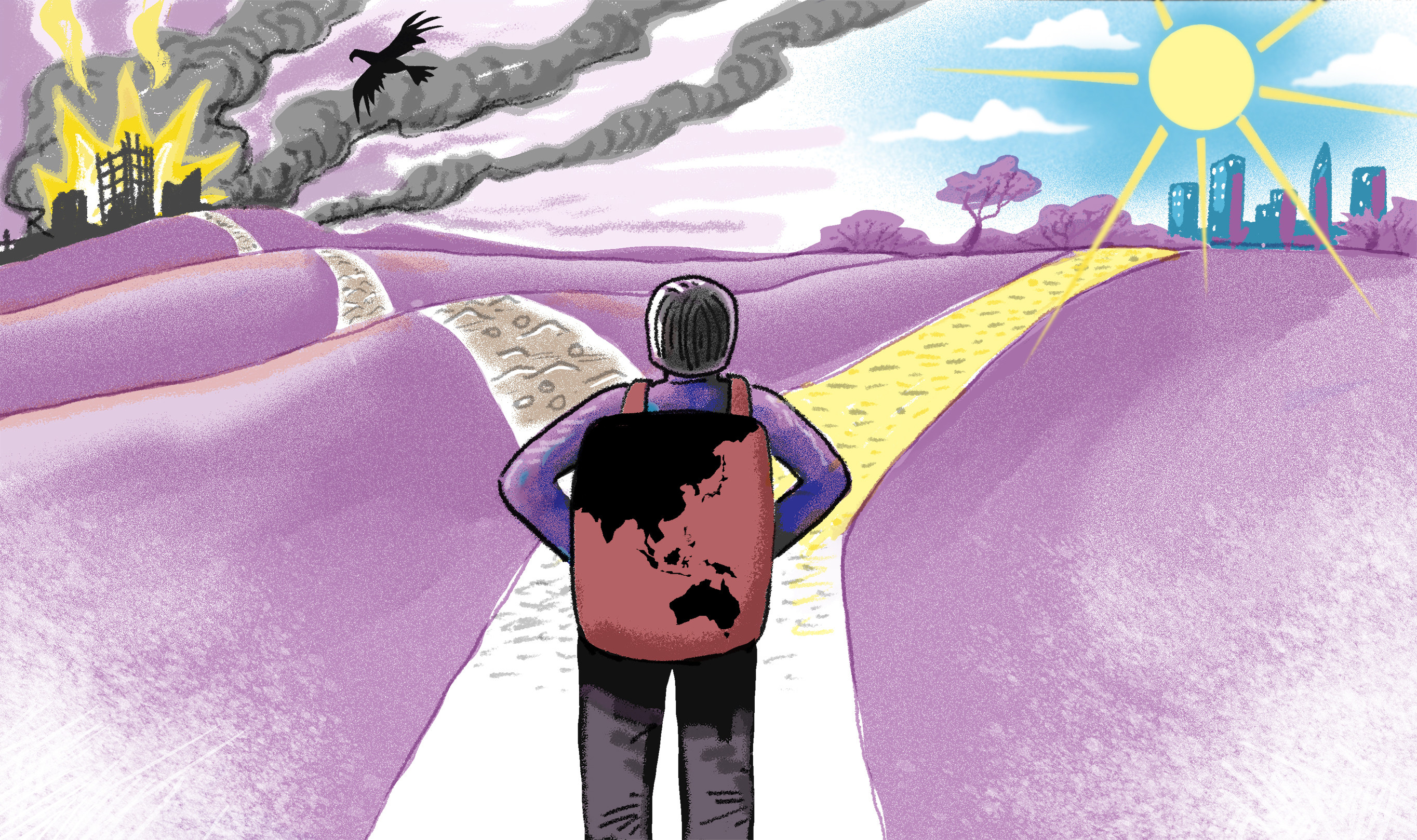
Three strikes on the world order
The hostilities between Russia and Ukraine, which have caused great concern in the international community, have been going on for more than a hundred days. This is not only a conflict between the two countries, but also serious disagreements, contradictions and clashes in the international system. From Moscow's point of view, one of the main goals of the special military operation is to destroy the dominant status of the United States in Europe. Russian Foreign Minister Sergei Lavrov has made it clear that all this is being done to end the US-dominated world order and to help build an equal international community. The reaction of Washington and Brussels is also unprecedented. The sanctions they have imposed are not only a kind of suppression of one of the parties in the clash between the two countries, but also aimed at ending ties between the West and Russia in trade, finance, technology and energy, as well as at reconstructing the world trade and economic system and the system of global governance. Therefore, both Russia and the United States pursue fundamental goals in this conflict.
Three blows to the system since the end of the Cold War
In 1998, Russia received an invitation to join the G7 and became a member of the G8. In 2001, China joined the WTO as a result of the basic formation of the international system after the end of the Cold War. Russia and China, America's two main adversaries of the period, were included in this system. It can be said that the moment when the United States allowed Beijing and Moscow to join the international system marked the overcoming of geopolitical and ideological differences, since at that time the United States focused on building an inclusive global system. But over the next 20 years, she was hit three times.
The first of these was the war in Iraq. By unleashing it bypassing the UN, America obviously challenged the dominance of the Organization in the field of international security and a number of important norms established by its Charter. This affected not only the Organization system, but also the system of US allies, as some of them, such as France and Germany, were strongly opposed to military action in Iraq. The first blow only damaged the international system, but did not destroy it. Why didn't she collapse? There are two main reasons for this. First, under the prevailing circumstances at the time, the United States had a significant advantage in strength, and the international community's response to Washington's actions was limited. Although many countries were resentful, they did not dare and were unable to fight back America. This is the unhealthy side of the international system, in which hegemony plays an important role. The second reason is that the United States paid a heavy price in the two wars in Iraq and Afghanistan, after which it self-regulated. After Barack Obama took office, the country leaned towards multilateralism.
The second blow came from the Donald Trump administration. One aspect of its influence on the international system is unilateralism and "leaving the group", which has caused serious damage to many international mechanisms and rules. Another manifestation was the unprecedented trade war against China, which not only hit the global supply chain and industrial chain, but also destroyed the norms of the international trade and economic system. Thus, during the Trump presidency there has been damage to the international system, the destruction of its rules and the weakening of the world order. After Joe Biden took office, on the one hand, some multilateral mechanisms and the system of allies were restored, but, on the other hand, a number of predecessor practices were inherited, especially in terms of China policy, restructuring the international trade and economic system and rewriting trade and economic norms. In this sense, the damage done by Trump to the international trade and economic system continues and increases.
Finally, the third blow is the conflict between Russia and Ukraine and Western sanctions. A clash between two countries—without sanctions—has limited impact on the international system because, after all, it is local. However, the numerous packages of anti-Russian measures are not only unprecedented in scope, but also seriously undermine established international rules. The impact of these sanctions on the international system will be huge and long-lasting.
Four new trends
There is currently a resonance between the US strategic rivalry with China and the sanctions imposed on Russia. The post-Cold War international system is trying to transcend geopolitics and ideology. However, ever since Donald Trump launched a strategic rivalry with China, America has taken back geopolitics and ideology and made them a priority in its foreign policy. When it comes to relations with China, the United States is focusing more on the so-called "value system" than on globalization and markets. Because of this, the ongoing strategic rivalry with China and sanctions against Russia are collectively fueling and accelerating four major trends.
First, turning interdependence into a "weapon". Economic interdependence is manifested in market, technological, financial and other aspects and is the result of economic activity. But now it is used by the West as an important weapon against China, Russia and some other countries (such as Iran, North Korea and so on).
Secondly, the security of economic relations. The logic of globalization is market based, and it consists in organizing investment, production and sales in terms of maximizing economic benefits. But today the United States and some Western countries are paying more and more attention to the security of economic relations. Regardless of technology, investment or production chain structure, the first thing to consider is the so-called security issues. The security of economic relations has severely damaged or even disabled the logic of globalization.
Third, turning international public goods into instruments. The American dollar and the dollar-based international payment system have become part of international public goods and should remain public goods, but they are now increasingly being used by America as a tool of foreign policy.
Fourth, the ideologization of international relations, or, in Western parlance, the so-called "value orientation." Today's international relations are increasingly based on a "system of values". Recently, Joe Biden visited Asia to promote the Indo-Pacific strategy, and one of the main flags in this was precisely the "value system".
Three Consequences
In this context, the global trade and economic system, the system of global governance and the system of international relations will undergo significant changes.
First, the transition from economic globalization to economic consolidation. The world is gradually splitting into different trading, technological and currency blocs. We have witnessed the "de-sinification" of the West, especially the United States, in trade, technology, investment and industrial chains, as well as the "de-dollarization" of many countries of the world in the monetary sphere. American sanctions against Russia using the dollar as a "weapon" may put pressure on it in the short term, but in the long term it will weaken the international credit of the US currency and encourage many to think about reducing their dependence on the US dollar.
Secondly, the weakening or even split of the global system of governance. For example, this year the United States demanded that Russia withdraw from the G20 meeting. Whether the G-20 can truly play its role as the main platform for macroeconomic coordination in the future remains an open question. At the United Nations, the divisions between Russia and China on the one hand and the United States and its allies on the other are becoming increasingly apparent. This phenomenon will gradually spread to the International Monetary Fund, the World Bank and other mechanisms of global governance. Cooperation in this area initially goes beyond geopolitics and ideology, but America is increasingly bringing these two factors to these platforms.
Thirdly, the reorganization of international relations. It is obvious that the world game unfolding around the conflict between Russia and Ukraine in the form of a UN General Assembly resolution condemning Russia's actions in Ukraine, sanctions imposed by Western countries against Russia, and the suspension of Russia's participation in the UN Human Rights Council, leads to a split in the international community . This means that the current international relations, focused on cooperation and the search for consensus, are weakening and tending to split into two opposing camps and one neutral camp. The participants in the neutral camp do not want to take sides, they adhere to a practical approach, focused on solving problems, and take different positions on different issues.
How far will these trends go? It depends not only on the attitude of the West towards Russia, but on its attitude towards China. Although Russia wants to end American hegemony, in terms of potential and political orientation, Russia plays a more destructive role, that is, weakens the hegemonic dominance of the United States over the system. However, building a more equal international system may depend more on the choices and actions of China and other developing countries.
(c) Wu Xinbo - Head of the Institute of International Studies of Fudan University
https://inosmi.ru/20220609/miroporyadok-254479896.html - zinc
https://colonelcassad.livejournal.com/7666793.html
3 foreign mercenaries sentenced to death in DPR
June 9, 16:56

News of the death penalty.
The court of the Donetsk People's Republic sentenced 3 foreign mercenaries (2 British and 1 Moroccan) to capital punishment. Serves right.
https://colonelcassad.livejournal.com/7667224.html
Operation "Hazelnut" and others
June 9, 21:27
Operation "Hazelnut" and others
We have repeatedly said that the Armed Forces of Ukraine and the political leadership of our country have been preparing for a war with Russia for a long time. Back in 2017, a plan was developed for the psychological operation ( https://telegra.ph/Funduk-Zaslon-Bolotn ... chad-06-09 ) and the work of all IPOC Centers. And now the entire information policy of our country is working as planned by this document. In terms of exercises, "Eastern" is Russia, and "Southern" is Ukraine.
In accordance with the Plan, several psychological actions are being carried out. We will indicate the most interesting ones, and see the rest in the document.
Psak “Hazelnut”.
Goal: Increasing the confidence of the population and personnel of the Armed Forces of Ukraine in the military-political leadership of the country;
providing assistance from the society to the actions of the Armed Forces of Ukraine, the formation of protest movements to counter a possible occupation.
Potential target audiences: the population located in the territory controlled by the Ukrainian authorities.
Psak “Barrier”.
Purpose: to prevent the armed invasion of the troops (forces) of the "Eastern" Armed Forces into the territory of the "Southern".
General target audiences: family members of the military personnel of the “Vostochny” armed forces, who are planned to participate in hostilities against the “South”, members of illegal armed formations and personnel of the “Vostochny” armed forces, who participate in hostilities in the ATO zone.
Psak "Voice of reason".
Purpose: formation of public opinions of international audiences on the aggressive policy of the “Eastern”, the need to strengthen economic sanctions against them and provide military assistance to the “South”.
General target audience: leadership and civil society in Western countries.
To determine the effectiveness of actions as indicators:
an increase in political, economic and military pressure on the leadership of the “Eastern”, the implementation of measures to constrain the actions of the “Eastern”;
increase in political, economic, military assistance to the "South" from the international community, individual states and organizations;
the appearance of statements about readiness to conduct (carry out) negotiations on a peaceful settlement of the situation.
Psak “Bolotnaya Square“.
Purpose: to reduce the level of confidence of the population of the "Eastern" in their military-political leadership, provoking protest moods against the aggressive policy of the president of the "Eastern" and his entourage, which lead to international isolation and deterioration of the socio-economic situation in the country.
General target audience: civil society of the “East”.
Psak "Affectionate dew".
Purpose: maintaining (forming) “pro-southern” sentiments among the population of the occupied territories and provoking protest movements directed against the “eastern” and occupation authorities.
General target audiences: the population of the occupied territories of the “South”.
Psak “Steppe wind”.
Purpose: demoralization of the enemy personnel, provoking tension between members of the illegal armed formations and the military personnel of the "Eastern".
It is very interesting in terms of the calculation of forces and means. It was planned to start the actions on a separate instruction and carry out from the points of permanent deployment. But at the very beginning of the special operation, a rocket flew into the building of the 72nd TsIPSO, and even the reconnaissance group of the Russian Guard ( https://t.me/omonmoscow ) entered Brovary. So things didn't go according to plan. Yes, and the Russians turned out to be much smarter than our IPSOshnikov. We quickly launched a counterattack in the information field. Now they and the employees of the GUR, the SBU and the national battalions are calculated and posted on their website "Nemesis ( https://t.me/nemeZ1da_ru) ".
In general, the document reflects the real state of affairs and will be of interest to specialists and journalists. Especially if you pay attention to the fact that the action "Voice of Reason" is aimed at psychological impact on the leadership and population of Western countries.
https://t.me/hackberegini/905 - zinc
https://colonelcassad.livejournal.com/7667961.html
Google Translator
***************************
Washington Starts Blame Game Over Defeat In Ukraine
The New York Times, here via Yahoo, has some rather weird piece over alleged lack of intelligence on Ukrainian warplanes:
U.S. Lacks a Clear Picture of Ukraine's War Strategy, Officials Say
President Volodymyr Zelenskyy of Ukraine has provided near-daily updates of Russia’s invasion on social media; viral video posts have shown the effectiveness of Western weapons in the hands of Ukrainian forces; and the Pentagon has regularly held briefings on developments in the war.
But despite the flow of all this news to the public, U.S. intelligence agencies have less information than they would like about Ukraine’s operations and possess a far better picture of Russia’s military, its planned operations and its successes and failures, according to current and former officials.
Governments often withhold information from the public for operational security. But these information gaps within the U.S. government could make it more difficult for the Biden administration to decide how to target military aid as it sends billions of dollars in weapons to Ukraine.
...
Avril D. Haines, the director of national intelligence, testified at a Senate hearing last month that “it was very hard to tell” how much additional aid Ukraine could absorb.
She added: “We have, in fact, more insight, probably, on the Russian side than we do on the Ukrainian side.”
One key question is what measures Zelenskyy intends to call for in Donbas. Ukraine faces a strategic choice there: withdraw its forces or risk having them encircled by Russia.
Andrei Martyanov rants about the piece:
Well, NYT decided to start steering clear of this whole Russia "lost in Ukraine" BS it promoted together with neocon crazies, and begins this ever familiar tune of the "intel failure". Right.
U.S. Lacks a Clear Picture of Ukraine's War Strategy, Officials Say
Hm, how about I put it bluntly--the U.S. never had clear picture on anything, especially on Russia, or, as a private case, [the Special Military Operation] and completely bought into Ukie propaganda, which shows a complete incompetence of the "intel" in the US.
...
The narrative on [the Special Military Operation], in reality, is dead and the failure is not being set, it already happened. It is a fait accompli no matter how one wants to put a lipstick on the pig.
Larry Johnson thinks there is another another motive behind the story:
Frankly, I find it hard to believe that there are not solid analysts at the Defense Intelligence Agency who know the answers to all these questions. The real problem may not be a lack of intelligence. Nope. It is the fear of telling the politicians hard truths they do not want to hear.
Given the billions of dollars the United States is spending on “intelligence” collection systems, it is time for the Congress and the American public to demand that the intelligence services do their damn job.
I do not believe for one moment that U.S. intelligence services do not know what is going on in Ukraine and in Kiev. They know that the Ukraine has lost the war and will have to sue for peace as soon as possible.
They also have told the White House that this is a case and that the whole idea of setting up the Ukraine to tickle the Russian bear was idiotic from the get go. The question now is who will take the blame for the outcome. Who can the buck be passed to?
There is always the option for politicians, as Andrei assumes is the case, to blame the intelligence and the various agencies which provide it. This was done when the war on Iraq, based on false claims weapons of mass destruction, started to go bad for the U.S.
But what the NYT piece does is passing the buck from the intelligence community to president Zelensky of Ukraine: "He did not inform us about the bad position his country was in."
It is cover your ass time and Zelensky prominence in the 'west' makes it possible to blame him personally for the outcome of the war.
On March 31 the Council of Foreign Relations, with its head Richard Haass, had a public discussion about the state of the war in Ukraine. One of the participants was the former Deputy Commander of the United States European Command Stephen M. Twitty. He knows and makes absolutely clear where the war stands:
TWITTY: I think the war in the Donbas is starting to turn to the Russians’ favor, and when you take a look at—and I’m particularly talking about the eastern part of the Donbas—the Russians have transitioned from trying to pour all their combat power into the Donbas to obliterating every single town. Whether it be Rubizhne, Lyman, they’re working now on Sievierodonetsk and Lysychansk as well, they’re obliterating these particular towns, and that’s how they’re making their headway. They’re not putting a bunch of combat power with infantry forces and tanks in there. They’ve taken all their artillery and they’re treating it like Mariupol and that’s how they’re making their headway. So they’re starting to make some headway in the eastern Donbas and so we have to watch that one closely.
HAASS: ... Why don’t we reverse [our policies]? General Twitty, is there something that the president said? Are things we’re not doing that we should be doing? Is there things that you would recommend at this point?
TWITTY: Well, as I take a look at this, you know, Secretary Austin came out that we’re going to weaken Russia. We have not really defined what weaken means, because if you take a look at the Ukrainians right now, I take a strong belief in Colin Powell’s doctrine—you overwhelm a particular enemy with force. And right now, when you take a look at Ukraine and you take a look at Russia, they’re about one to one. The only difference is Russia has a heck of a lot of combat power than the Ukrainians.
And so there’s no way that the Ukrainians will ever destroy or defeat the Russians, and so we got to really figure out what does weaken mean in the end state here. And I will also tell you, Richard, there’s no way that the Ukrainians will ever have enough combat power to kick the Russians out of Ukraine as well, and so what does that look like in the end game.
There follows some discussion with other participants about potential outcomes the U.S. would like to see, like Ukraine in the state that it was in before 2014.
Twitty then explains why those ideas are all unrealistic and that what is needed instead are immediate negotiations:
TWITTY: Yeah. So I got a couple of things for you, Richard. So I want to go back to what you said. Pre-2014—I want you to think about that one, because I’ve had time to think about it hearing others here, and what I will tell you, Richard, you know, I learned from the National War College there’s something called ends, ways, and means.
So if that’s your end state—pre-2014—then I’m interested to hear the ways and the means because, from a military standpoint, if that’s the way then the means would be the Ukrainians lack, again, the ability to pull that off to pre-2014. They just lack that ability. They don’t have the combat power.
And I also want to remind you we hear a lot about Russian casualties and Russian losses. We hear very little about Ukrainian losses, and keep in mind they’re losing soldiers throughout this war as well. They started at approximately two hundred thousand. Who knows where they are today?
And so it’s hard to recruit and maintain that level of professionalism in that military. So that’s my first point. The end, ways, and means, they lack that, to be able to go back to the pre-2014.
The second point that I would make is, you know, as you look at the DIME—diplomatic, informational, military, and economic—we’re woefully lacking on the diplomatic piece of this. If you notice, there’s no diplomacy going on at all to trying to get to some type of negotiations. And I don’t think that we can lead that, given where Putin thinks about us.
But if you sit back and think about those that could possibly be a part of this negotiation team, you know, you have the—two of them are in—that I’m going to list are in NATO. One is President Orbán out of Hungary. Perhaps he can help out in the negotiation effort. The other one is President Erdoğan of Turkey. Longtime friends of President Putin, although some view that relationship as transactional. I don’t know. Let’s put it to the test and see.
Someone objects and makes a case for 'giving the Ukraine more time' by pushing more weapons to them. Twitty dismantles that argument:
TWITTY: —Charlie, I agree 100 percent. But I will tell you, when you look at time, the Ukrainians have to go into negotiations with the upper hand at a position of strength, and so right now they are at a position of strength. The more this war goes on we never know if that’s going to wane, and then they will lack the ability to go to the bargaining table at a position of strength and may lose more than they intended, and so let’s keep that in mind as well.
There it is. The professional military and intelligence people know exactly what is up. The Ukraine is already in a very bad situation and from here on it can only get worse. They expect that the Ukrainian frontline will break down. I am sure they are urging, like Twitty does above, for immediate negotiations using whatever third party is available.
It is the White House for which such an outcome is not what it had hoped to achieve. It can in fact not allow it. It is currently blocking any negotiations because admitting to a loss in Ukraine would give the Republicans more ammunition to damage Biden.
Yves Smith detects some signs that, behind the curtains, some direct negotiations between Ukraine and Russia are actually taking place:
We may know in due course, but this development, even if these talks are more at the feeler stage, is proof that Zelensky is losing power. Recall that there has already been some chatter about a possible military coup. And it is hardly uncommon for the senior officials of a leader on the ropes to start negotiating with the other side, both out of the best interests of their country and to improve their odds of survival.
...
So that is a long winded way of saying that Zelensky may not have altered his stance, but that instead he is no longer driving the train. And it may also be that some in the Ukraine government are also trying to get the UK’s and US’s hands off the wheel. It may be too early for that to happen, but if they keep trying to shore up Zelensky when his own senior staff (and the military) are turning against him, they could find they bet on the wrong horse. Again, I’m not saying this is a likely outcome, but the fact that it is even conceivable is a big change in the state of play.
Passing the buck to Zelensky, to then have him removed from this planet, may indeed be the best outcome for the White House ... and for Ukraine.
Posted by b on June 9, 2022 at 15:13 UTC | Permalink
https://www.moonofalabama.org/2022/06/w ... .html#more
************************************
From Cassad's Telegram account:
***
forwarded from
Chinese army
The US Congress Armed Services Committee decided to expand the use of satellites of private companies to conduct military space intelligence of the situation in Ukraine.
The decision came despite the already widespread use of satellite data by private US companies such as Maxar Technologies , Planet and BlackSky . The issue of attracting at least five more companies is also being considered.
***
forwarded from
Readovka
The map of hostilities and the situation on the fronts on the evening of June 9
The main topic of the day was the verdict of the court with the death penalty for three foreign volunteers of the Armed Forces of Ukraine in the Donetsk People's Republic. The British mercenaries Sean Pinner and Aiden Aslin , who participated in the hostilities in the Donbas on the side of the Armed Forces of Ukraine, as well as the Moroccan Saadun Brahim, will be executed. Western "colleagues" began to worry about their fellow citizens, as in the future they will be judged in even greater numbers and this will put strong pressure on the Western world in the course of future negotiations.
There are battles for Slavyansk .
👁From the interesting: Western anti-ship missiles as a subject of bargaining for grain. For several days now we have been talking in detail about the fact that bidding is going on in high geopolitical orbits for access to the ports of Odessa . There is only one goal - to take out Ukrainian grain. At the same time, there is still no final scheme for this operation. Despite the low probability of the delivery and subsequent use of these missiles against the Russian fleet (the West still fears a total escalation), we considered it necessary to explain what Exocet, Harpoon and Brimstone missiles are . What are the dangers of new possible deliveries to Ukraine, and whether they will be understood in the material Readovka explains.
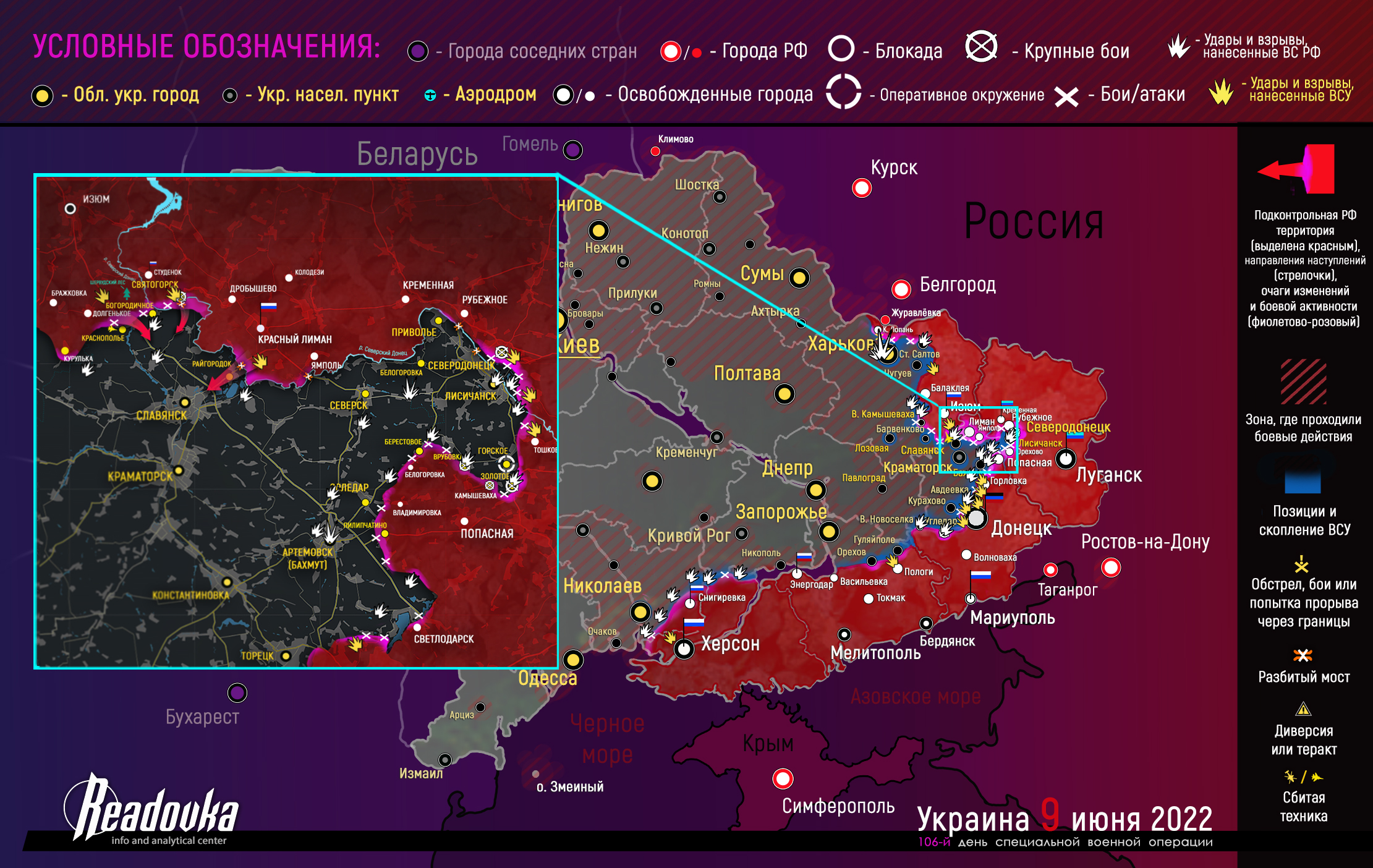
***
forwarded from
Vladislav Coal
Summary of hostilities on June 9, 2022 from Vladislav
Ugolny
***
forwarded from
RIA News
Special operation, June 9th. The main thing:
***
forwarded from
Rybar

https://t.me/s/boris_rozhin
Google Translator




